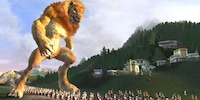
Background information
"Populous", "Black & White" and beyond? The evolution of the god simulation
by Kim Muntinga

"Fata Deum" aims to bring back the fascination of the old games of the gods. Between village building, belief systems and divine rivalries, a game unfolds that combines classic mechanics with moral decisions - not yet perfect, but with recognisable potential.
I am God. No form of flesh and blood, no face, no voice that mortals could hear. And yet they sense me. I look down at the many villages that spread out like small dots in the landscape. Tiny people bustle busily between fields, temples and huts. Some pray, others labour as if there were no tomorrow.
Sometimes I give them my favour, sometimes I punish their disbelief. Invisibly, I leave traces that change their world. But I am not alone. Other gods claim the same people for themselves, luring them with promises or threatening them with wrath. Every temple, every village, every soul becomes a battleground in the divine competition.
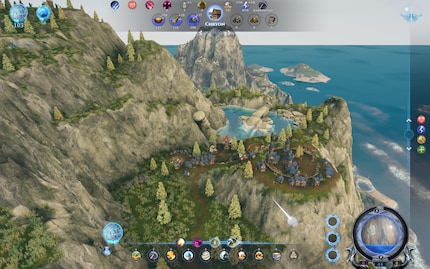
This is exactly where «Fata Deum» unfolds its fascination: a simulation of the gods in which I not only control worlds, but also have to prove that my faith is the stronger one.
The small German studio 42 Bits Entertainment is behind the game, which is still in Early Access. As a simulation of the gods, it follows in the tradition of classics such as «Populous» and «Black & White». The genre has been oscillating between niche and cult status for years, as I described in my article on the evolution of god games. «Fata Deum» is now trying to revitalise this old feeling of omnipotence and breathe new life into the genre.
As big as these words sound - in practice, playing God in «Fata Deum» feels surprisingly down-to-earth. My power unfolds not in all-encompassing gestures, but in a clear rhythm that structures my days.
A typical day in «Fata Deum» begins unspectacularly: I observe my settlements, recognise believers and doubters. I can intervene, bless or threaten, steer people in certain directions. Sometimes all it takes is a small impulse - a spark of favour that binds a family closer to me, or a punishing breath that strikes fear into the hearts of unbelievers.
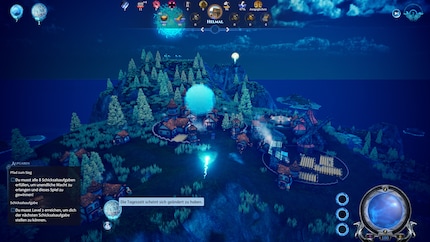
In the night, I plan strategically, influence the dreams of my followers and set the course for the future. This is where I decide which construction projects to start, which structures to consolidate and which wishes or fears to anchor in my followers' subconscious.
When the day dawns, the effect of my decisions becomes apparent: Some villages flourish, others falter - depending on whether I have strengthened trust or sown doubt. The phases of visible intervention during the day and strategic planning at night form a dynamic cycle in which each of my decisions can leave a lasting mark on the world.
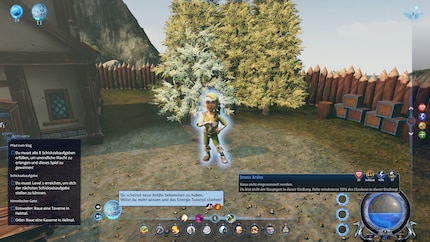
However, this is where I struggle with the implementation. Much remains opaque. Even after the tutorial, I only half understood some of the mechanics. When is the best time to inspire my inhabitants? When is the right moment for an expansion? Questions like these accompany me and lead directly to the foundation of the game: building.
When I arrive on a new island, the people are already there. They are building, ploughing, praying - without me, but not without faith in Mother Nature. I don't step into a desert that I have to fill, but into villages that keep themselves alive. My task is to bind them to me and guide their development.
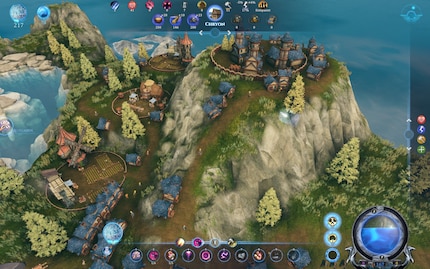
But I can only build when half the people follow me. As long as their faith wavers, my hands remain tied. Only when enough eyes look up to the sky will new possibilities open up: Then I can build temples, plan taverns or set up new production facilities.
Alternatively, I can also found completely new villages at some point with the necessary skills to further expand my influence and create new settlements from scratch.
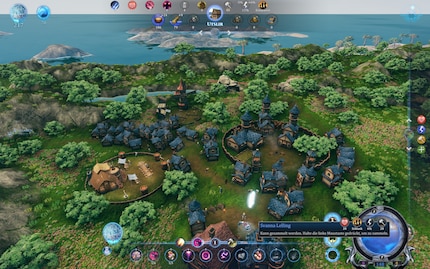
The building orders are the result of my influence, but the settlement organises itself independently. I determine locations for buildings, perhaps move a person with my invisible hand, and the village reacts: structures and priorities shift. Not because I give direct orders, but because my will acts like an invisible current.
A core element of «Fata Deum» is the resource system, which has a decisive influence on the construction and development of settlements. The most important resources include food, wood, stone and iron, which are required for infrastructure, tools and buildings. Mana also plays a crucial role as a divine source of energy, which is generated through prayers and offerings from followers and is essential for working miracles.
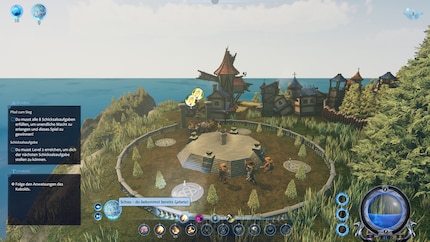
On the one hand, resource management looks classic, but divine intervention gives it its own twist: I have to make sure that enough building materials are available and that food is reliably produced and distributed. With my divine interventions, I can also change the flow of resources. I intervene myself and collect wood or food and give it to my people via the village centre.
This interplay of construction and spiritual influence creates an exciting balance in which not only quantity, but also the morale and faith of the population shape the game world. A mechanic that I already liked in «Black & White».
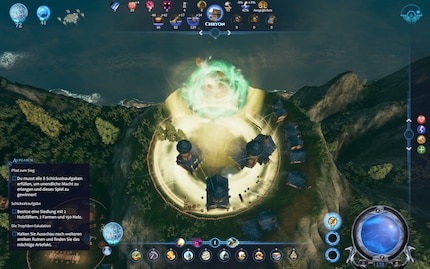
In practice, resource handling constantly forces me to make strategic decisions: Do I promote one village while another stagnates? This dynamic is appealing, even if the Management usually remains rather functional and offers little depth. Together with the other mechanics, it nevertheless conveys that divine feeling of power and responsibility.
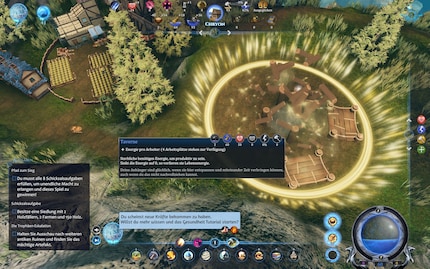
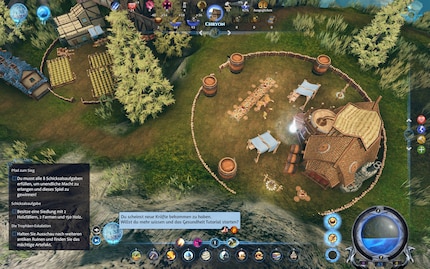
For example, I can initiate trade between the villages. Food, wood or stone can be moved if one settlement has too much and the other is about to come to a standstill. In practice, however, this is hardly comprehensible. I lack any clear overview of how resources are actually flowing. I can see what is currently in storage, but not how stocks are developing or which villages are really benefiting.
After building the material foundations - houses, food and resources - the really fascinating game begins in «Fata Deum»: shaping and directing people's faith. But how do you gain followers and how do you lose them? The game relies on a dynamic mood and belief system.
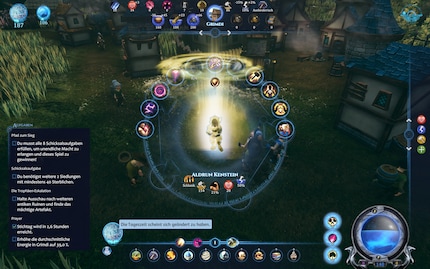
Welfare is created through regular visits to the temple. It increases the offerings and replenishes my mana supply. Fear, on the other hand, can enforce submissiveness in the short term, but an excess of it creates unrest. Villagers flee or rebel, and my terror can almost rob a village of its faith.
Unfortunately, the effects of these mechanics on the villages are barely visible - and therefore difficult to understand.
In addition to building and spiritual influence, wars characterise the events between the villages. I have the power not only to lead my followers with a gentle hand, but also to turn them into fanatical warriors. My behaviour - whether I give kindness or fear - directly influences how my settlements act.
Fear and terror can enforce submission, but they also bring destruction. Villages characterised by violence suffer from instability and decay. The decision in favour of a tyrannical or benevolent path is therefore more than strategic: it is moral. My warriors set out to attack neighbouring villages or defend their own borders.
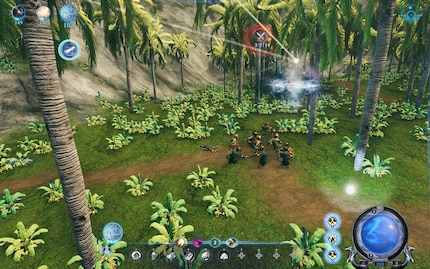
The outcome depends not only on the strength of the armed forces, but also on morale and divine assistance. The battles are therefore also a reflection of my divine decisions: Violence leads to terror and mistrust, while benevolence promotes peace and growth. The battles themselves still seem rudimentary, which is due to the early access status. Nevertheless, there is great potential.
I'm not alone. Depending on the map, I compete against up to four other gods who claim their share of the faith. These rivals have their own personalities and strategies: from the caring fertility goddess to the violent god of war. The competition is dynamic and is characterised by economic growth as well as the climate of faith in the villages.
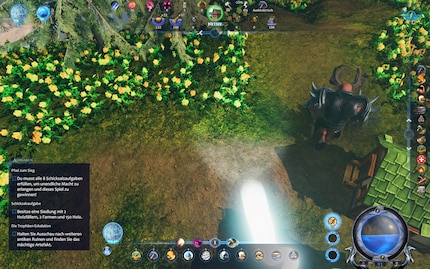
Conflicts are not just a blunt competition for resources, but are often chaotic and tense. I can directly challenge rivals, weaken their supporters or strengthen my own supporters. This creates an atmosphere of constant threat in which my divine influence is constantly put to the test.
Visually, «Fata Deum» relies on a charming, stylised graphic style reminiscent of classics such as «Black & White». The lively villages, the hustle and bustle of the inhabitants and the detailed islands create an interesting world, the atmosphere of which is carried by relaxed to epic music. However, the interface seems more functional than majestic, which somewhat flattens the divine role of the player.
What really bothers me is the lack of basic overviews and information displays. Yes, I have a resource overview or can see how many inhabitants of a village believe in me or in another deity. However, there is no proper overview of the individual villagers. I can choose to display the energy bar for all inhabitants. However, this tends to make me lose track even more.
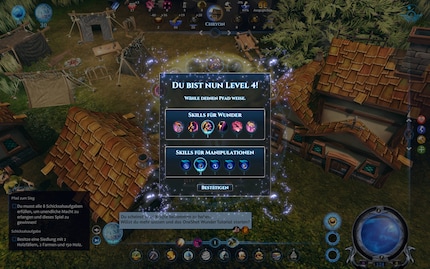
Simple list or map views to access specific people are completely missing. Instead, I have to laboriously scroll from place to place to select individual characters. This makes precise interventions difficult and doesn't seem very user-friendly.
The feedback on my decisions also remains weak. I often get hardly any tangible feedback on how blessings, threats or miracles specifically affect the morale, faith or mood of a settlement. Especially in a game that relies so heavily on spiritual influences, this is disappointing.

The controls work in principle, but often feel fiddly. By default, it is controlled via mouse and keyboard. Placing buildings is unnecessarily complicated: it often takes a while to find a place where I can build my tavern, for example, and then I also have to align it so that the road fits halfway.
The handling with the invisible hand doesn't seem smooth either. More than once I had problems letting go of objects or people. The game's feedback remains vague and the controls are awkward. I may have been clumsy at times, but this is exactly where the game needs clearer feedback.
«Fata Deum» does not offer a linear campaign with fixed missions, but rather story-based quests that lead me as a player into various tasks and challenges. These quests are assigned by the goddesses of fate and provide a certain structure that goes beyond the pure sandbox experience.
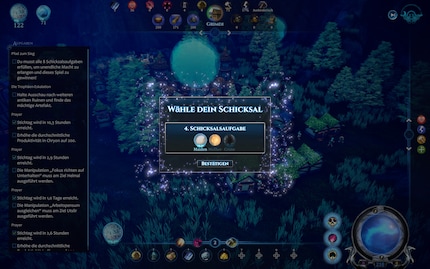
I like the island-by-island approach, where I expand my deity piece by piece depending on the map. Each island represents a new stage with its own villages, resources and rival gods. It's fun to strategically increase my influence and cultivate my loyal followers at the same time. However, despite the quests, which repeatedly set small goals, the game lacks a clear, overarching thread to guide me in the long term. It sometimes feels a little open and unstructured, which sometimes reduces motivation for me.
The mixture of sandbox feeling and small missions works well, but I would like to see more narrative depth and tangible moments of progression to reinforce the feeling of really being on a divine odyssey.
The fact that «Fata Deum» is in Early Access is noticeable in many places. Although the game is stable, many things still seem incomplete: Animations are stiff, menus fragmented, feedback loops immature. In particular, the overview of inhabitants, resource flows and belief distribution is crying out for an overhaul.
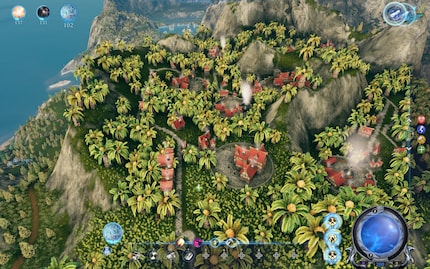
At the same time, the game shows how much potential there is in the idea. The mixture of classic settlement building and moral influence sets it apart from pure city builders. It is reminiscent of genre classics such as «Populous» or «Black & White», without merely copying their concepts. This is precisely the niche that «Fata Deum» could fill - if the developers deliver more depth and consistently improve the user interface.
I am confident that the developers will listen to the Community. «Fata Deum» is already showing what it could become if the right adjustments are made.
«Fata Deum» was provided to me by 42 Bits Entertainment for the PC. The game has been available since 15 September.
My interests are varied, I just like to enjoy life. Always on the lookout for news about darts, gaming, films and series.
Interesting facts about products, behind-the-scenes looks at manufacturers and deep-dives on interesting people.
Show all
Background information
by Kim Muntinga

Background information
by Kim Muntinga

Background information
by Kim Muntinga